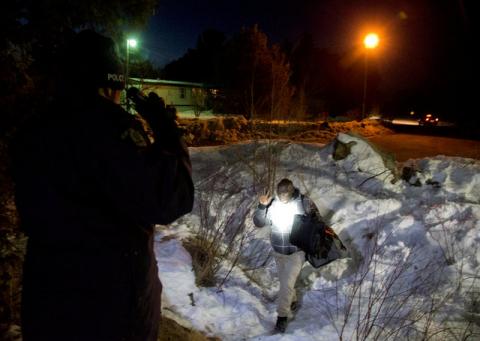Advertisement
'I need to be safe' - Crossing into Canada from the U.S.
HEMMINGFORD, Quebec (Reuters) - A Sudanese man hopped out of a taxi just before daybreak, a duffle bag slung over his shoulder as he headed for the U.S. - Canadian border.
Within seconds, the man, who was braving negative 6 degrees Celsius (21 degrees Fahrenheit) weather, was confronted by a Royal Canadian Mounted Police (RCMP) officer who shined her flashlight on him as he crossed into Hemmingford, Quebec, from Champlain, New York.
"Stop! You have to stop," the officer insisted, grabbing his arm.
Over and over, the man, who did not provide his name, muttered as if speaking to himself, "I need to be safe. I need to be safe. I just want to be safe." He kept walking, desperately trying to plow past the officer.
Several hundred asylum seekers have entered Canada as U.S. President Donald Trump vowed to crack down on immigration.
Dressed in a checkered sweatshirt, pants and snow boots, the man only stopped when the officer said, "You're in Canada already. You're in Canada. You're here."
Now, with no reluctance, he put his hands in the air as she told him he was under arrest and that he had entered Canada illegally.
The exchange lasted all of four minutes.
Less than an hour later, a Turkish family of four showed up, also by taxi.
A young girl in pink pants and scarf, toting a small pink suitcase, pressed a doll under her arm as she tread through the snow behind her father, who was being placed under arrest.
She kept her head high and eyes focused straight ahead, looking back only once to make sure her little brother and mother were safe.
Tears began rolling down her cheek when she and her family were placed inside a police car.
Thirty minutes later, two parents and five children from Sudan arrived at the Champlain border in a white Chevy van after having driven from Texas. The father sprinted from the van first, somersaulting over a snow bank. He then helped his wife and children over it. The Canadian officers helped them, too.
"Are they leaving it?" one U.S. Border Patrol agent yelled to the RCMP officers while pointing to the van.
The mother nodded. A tow truck later took the car away.
The father dropped his cell phone on the U.S. side but was told by a patrol agent that if he crossed back to get it he would be arrested.
GETTING TO THE BORDER
Curtis Seymour, 62, has been a cab driver in Champlain for 10 years. His shift starts at 1:30 a.m. and usually ends around 9 a.m., depending on the day.
"It's definitely gotten busier," Seymour said, estimating that some mornings he makes upwards of 10 trips to the border.
"I explain to them, 'You will be arrested, you will be handcuffed, you will be brought to immigration and held there for who knows how long.' They say, 'That's OK. We want to be in Canada. We have to be in Canada. We have no other choice.'"
Seymour, of Plattsburgh, New York, said he voted for Trump. But, he added, "I feel bad for these people" referring to his customers who are trying to reach Canada.
"They have kids - a lot of them newborn babies. It doesn't take them much time to cross the border," he said. "But they have to go down a ditch and then climb over a big snow bank, lugging all they have left. Many customers leave their child's car seat behind. It's just too much to carry."
(Reporting by Christinne Muschi in Canada; Writing and additional reporting by Melissa Fares in New York; Editing by Diane Craft)



















Add new comment